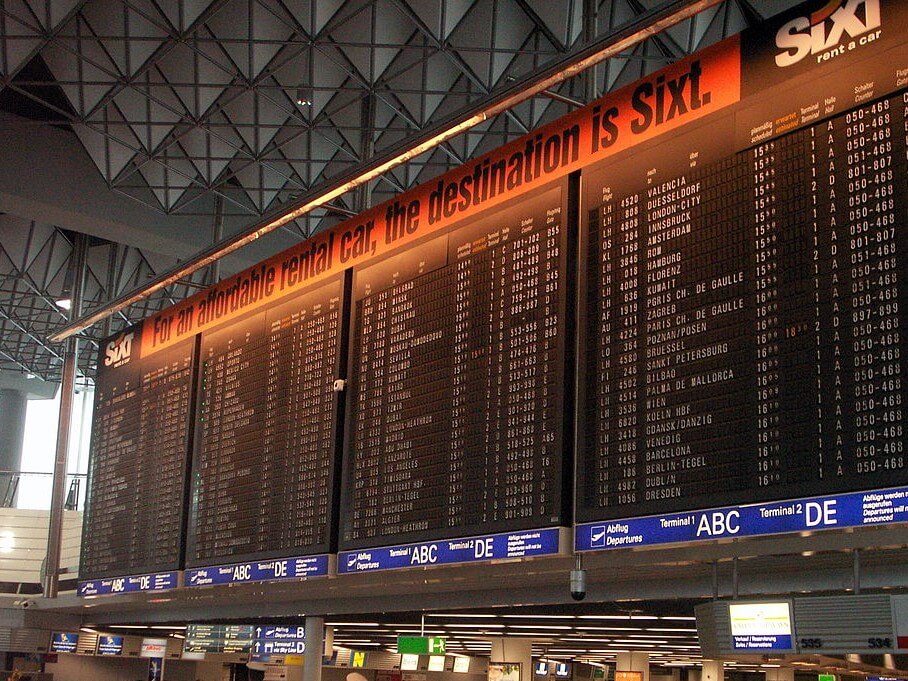UPDATED 16-01-2019 16:40 (UTC +2)
German security workers have continued their rounds of strikes this week in attempt to sway salary negotiations. The latest walkout came less than 10 days after strikes at western German airports led to cancellations of over 600 flights. The new round of strikes by airport security personnel affected eight major German airports on Tuesday, January 15, 2019, sparking a wave of cancellations that affected 220,000 passengers, German officials have said.
At Frankfurt am Main, Germany’s largest airport, security staffers, represented by the DBB and Verdi trade unions, started their walkout at 2 a.m. local time (0100 UTC) on Tuesday, January 15, 2019. But the action did not end there. Verdi, the union representing airport security workers, launched “warning strikes” at seven more airports: Hanover, Bremen, Hamburg, Munich, Leipzig / Halle, Dresden and Erfurt.
The organization claims that the action is related to unsuccessful collective bargaining negotiations with BDLS, an organization representing Germany’s airport security companies. Verdi is calling for hourly wage increase to €20 ($23) for passenger, freight, personnel and goods control workers, claiming BDLS has only offered an approximate 40 cents increase so far. The present rate is €17, BBC reports.
Airport security workers strike at Frankfurt Airport #solidarity @_verdi pic.twitter.com/y0gdTWoOWU
— Mark Bergfeld (@mdbergfeld) January 15, 2019
The full-day strike led to the cancellation of services across Europe as well as intercontinental flights. According to German Airports Association, the walkouts “paralyzed” airline network in Germany. “Once again, the airports are abused as the scene in a labor dispute, in which they are not even tariff party,” the association stated.
“Brace for impact”
The strike action, however, did not come as a surprise. It had been announced in advance: Frankfurt airport, as well as Lufthansa (LHAB) (LHA) , which cancelled 500 flights, had urged passengers to prepare for major disruption as early as January 11, 2019.
Flight schedule disruptions to and from Frankfurt on 15 January 2019 due to a strike by security personnel at the airport Frankfurt. Please check here https://t.co/v5bFU1zbOK regularly for further information.
— Lufthansa (@lufthansa) January 11, 2019
On January 15, Frankfurt airport released a travel advisory claiming major disruptions and flight cancellations were to be expected all day. Passengers departing locally from Frankfurt were urged not to travel to the airport, while transfer processes for connecting passengers were said to be “possible”, but with delays and disruptions.
As a spillover, Lufthansa (LHAB) (LHA) has anticipated “a considerable amount of disruptions” due to the strike at its hub, calling the action “unacceptable”:
“Although all aviation partners agreed that we want to improve the situation for our passengers in 2019, the Verdi union is escalating this collective bargaining dispute disproportionately and to an unacceptable extent,” Detlef Kayser, Member of the Executive Board of Deutsche Lufthansa AG for Airline Resources & Operations Standards is quoted as saying in a press release on January 11, 2019.
“This series of strikes can certainly no longer be described as warning strikes. It is also clear that Verdi has no interest in making its contribution to improving Germany as an aviation location. We already have the lowest quality security checks at the highest costs, compared to Europe and other countries around the world,”
Meanwhile, Hanover airport warned passengers about longer waiting times before the security checks, delays and flight cancellations. It distanced itself from conflict with the union by pointing out that “the passenger controls at Hanover Airport are a sovereign task of the Federal Police, which uses private security companies”.
Hamburg, Bremen, Munich, Dresden and Leipzig / Halle airports all warned passengers of “significant” delays and cancellations, advising passengers to contact their airlines.
Precedents and consequences
The security staff walkout at the aforementioned airports affected around 220,000 passengers, German Airports Association estimated. Around 135,000 passengers were affected at Frankfurt Airport alone.
According to its operator Fraport, the airport had to cancel 617 out of around 1,200 scheduled flights that day over the strike action that lasted 18 hours, Deutsche Welle reported. Germany’s second largest airport, Munich, had to cancel around 100, mainly domestic flights. Bremen airport saw approximately two thirds of all flights being delayed or cancelled.
Last week, on January 7, 2019, a four-hour strike action was staged at Berlin’s Tegel and Schönefeld airports, reportedly delaying around 80 flights.
On January 10, security staff strikes were staged at Düsseldorf, he country’s third-largest airport, as well as Cologne and Stuttgart airports. In Düsseldorf, two-thirds of flights were cancelled that day, affecting about 60,000 passengers; in Cologne 130 out of 200 flights were axed; in Stuttgart 142 out of 270, BBC reported citing ARD TV .
Negotiations between Verdi and BDLS are expected to continue on January 23, 2019. If agreement is not reached, more strikes are expected to ensue. But for now, seems like things have gone back to normal as of January 16, 2019, with operations having resumed at the airports.

